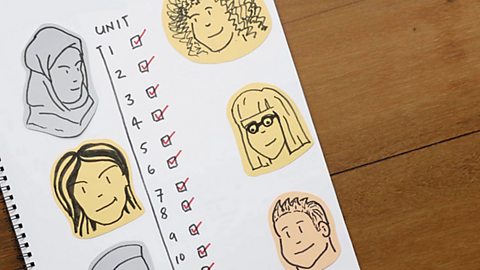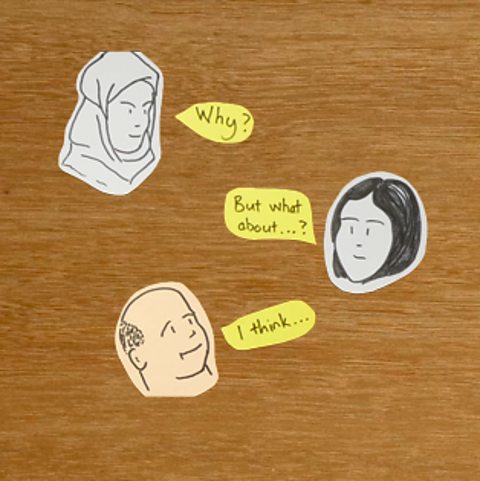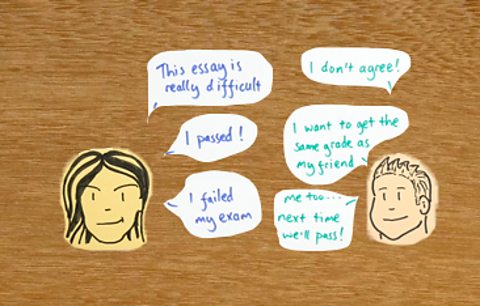Unit 8: Go The Distance: Social learning
Select a unit
- 1 Go The Distance: Choosing distance learning
- 2 Go The Distance: Academic reading
- 3 Go The Distance: Academic talk
- 4 Go The Distance: Academic writing
- 5 Go The Distance: Finding and using source material
- 6 Go The Distance: Going the distance
- 7 Go The Distance: Critical thinking
- 8 Go The Distance: Social learning
- 9 Go The Distance: Projects
- 10 Go The Distance: Succeeding in exams
Session 3
Study Skills 8 – Social learning
Welcome back to the 'Study and Exam Skills' area – the home of our video series with top tips to help you on the way to successful studying. This time we're bringing you a guide to an area of study that's becoming more and more important: social learning.
Activity 1
Make the most of your student community
Distance learning: isn't it perfect? You can study when it suits you, where it suits you – and you can save money! There's just one problem. You can feel lonely. Don't! Scroll down to watch the video and get the advice you need to make the most of your student community.
Study well with your fellow students

It's not just about you!
Learning well isn't just about you and a lesson, it's about you, a lesson and your student community! So, you need some study buddies. But you're a distance learner. What can you do? Watch the video for some suggestions!
To do
While you watch, listen out for THREE advantages of studying in pairs or groups and FOUR tips for using social media and online technology with a student community. Write them down if you like, and you can check your answers – in an activity – later on this page.
Watch the video

Narrator
Ah. Distance learning, isn't it perfect? You can study when it suits you, where it suits you, and you can save money. There's just one problem. You can feel lonely. Do you ever feel lonely? It’s ok: this isn't a dating video. We're here to talk about education. You see, learning well isn't just about you and a lesson, it's about you, a lesson and your student community!
In fact, many experts believe we learn most effectively when we interact with other learners. Learning together in groups or pairs can even improve your scores. Let's say you've learned some new information. Discussing and sharing this info means you process it again and again, helping you form long-term memories. And by questioning all the angles, you get a broader understanding of your topic, and you don't get stuck in your own head. It means you have someone else with whom you can complain, debate, celebrate, compete and commiserate. And if you're motivated and engaged, you're more likely to complete the course.
So, you need some study buddies. But you're doing distance learning. What can you do? Here are some suggestions. You can join an online forum on the topic. Maybe your course has a forum already. Use it. Or start a new one. And maybe you're on a course with its own page or group on social media. If not, then, why not start one? And you don't just have to write messages to your fellow students. Try using software or apps to talk to them, or even do video calls. And remember, if you want to make the most of these groups, it's best to have some structure and guidelines or rules for taking part.
All of these are informal ways of staying in touch with other students, but your course might ask you to do formal tasks, such as collaborating on a project. In which case, your course will probably provide or suggest online tools. So try to use these tips to create your own online study community, so that you're not left out in the cold.
Three advantages of studying with others
3 Questions
Check you've understood the advantages of social learning by answering these questions.
Help
Activity
Check you've understood the advantages of social learning by answering these questions.
Hint
Make sure you have someone else with whom you can complain, debate, celebrate, compete and commiserateQuestion 1 of 3



Help
Activity
Check you've understood the advantages of social learning by answering these questions.
Hint
Question all the angles with the members of your student communityQuestion 2 of 3



Help
Activity
Check you've understood the advantages of social learning by answering these questions.
Hint
Discussing and sharing this information with others means you process it again and againQuestion 3 of 3




Excellent! Great job! Bad luck! You scored:
Next
There were also four tips about communicating with other distance learners. Did you get them all? Go to the next page to test your understanding.
Session Vocabulary
Find out more about distance learning – visit our partner,The OU
____________________
To help you understand the tips in this Study Skills video, here are some key words and their definitions:
forum
an online space where people share ideasto collaborate
to work together on a specific taskto be left out in the cold
to be ignored or forgotten